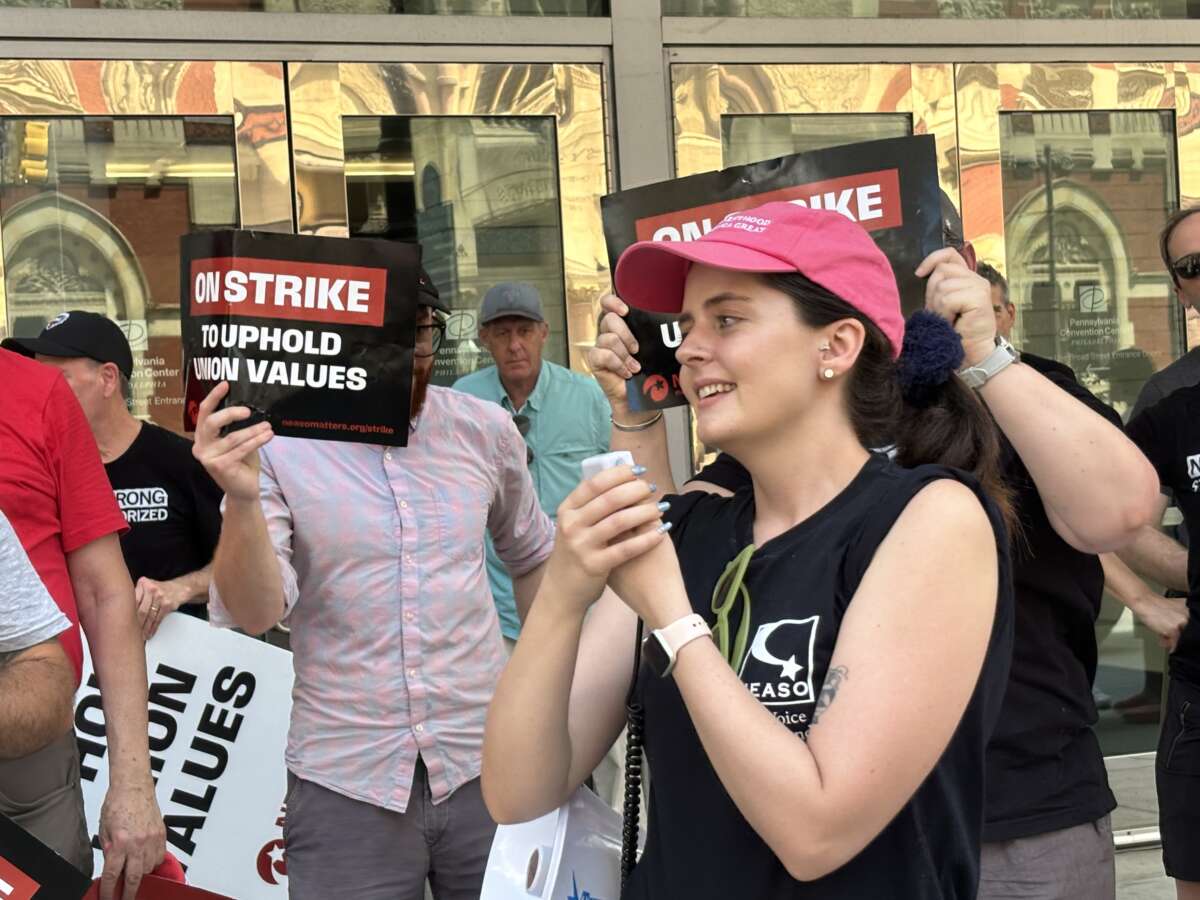Did you know that Truthout is a nonprofit and independently funded by readers like you? If you value what we do, please support our work with a donation.
On July 23, I had a critical appointment with my nephrologist to discuss how long I can delay my next kidney infusion without dying. Together we made the extremely painful decision to wait to schedule my needed treatment until my employer stopped threatening to cut off my health care.
You see, I have a rare autoimmune disorder that attacks my kidneys. Without regular treatment, my kidneys simply don’t work. I am not ashamed of having a disability. I’m grateful to my doctors who diagnosed me, a 30-year-old with a sudden onslaught of strange and scary symptoms, and saved my life.
But today, I am deeply ashamed of my employer, the National Education Association (NEA), the nation’s largest union, which told me and more than 300 of my colleagues — my siblings in NEA’s staff union — that it would cut off our health insurance on July 31. As of today — likely thanks to public pressure, including an awareness of the impending publication of this op-ed in Truthout and the publication this morning of an article in KFF Health News — NEA management has walked back their threat to cut our health insurance. Regardless of how this plays out, NEA’s attempt to use my disability as a bludgeon at the bargaining table sets has been a betrayal of the core values I thought we all shared.
We expect NEA management to come to the table in good faith so that together we can create a contract that respects staff and the work we do, ensures staff can stay and grow within the organization, and adapts to the realities of the modern workplace.

My colleagues and I are highly skilled, experienced and professional union staff. We make NEA run. As a senior digital strategist, I’m specifically responsible for engaging about 3 million educators in NEA’s work — whether it’s ensuring teachers have online resources to support students with disabilities or using digital tools to rally educators for standardized testing reform. Among my many duties? Managing the NEA president’s online voice and brand, which includes running her social media.
My colleagues are education policy specialists, media experts, liaisons to Congress and the White House, and so on. Together, we are working to expand the teacher pipeline; to help our members get fairly paid; to fight book bans; to ensure college affordability; and, notably, to oversee the nation’s largest get out the vote operation for pro-public education candidates up and down the ballot. And truly, that’s just a fraction of the work we do — the work we love to do — to strengthen our union, improve public education, and advance racial and social justice.
But now, instead of doing this critical work, one of my colleagues is worried about rescheduling a heart procedure that her cardiologist recommended she do in August. Another colleague is 39 weeks pregnant with her first child; her joy has been replaced with anxiety about paying for the delivery and getting postnatal care for her and her daughter. Others are looking up the prices of their medications for diabetes, depression or migraines and considering their options — to buy expensive medication or buy food instead.

The kidney infusion that I need to stay alive costs about $100,000 without insurance. Do I need to tell you that I can’t afford that? My nephrologist and I are hoping and praying that NEA stops playing with my health care as I live in fear that, without crucial care, my kidneys could start to shut down.
In an email to Truthout at 10:53 am ET today, an NEA spokesperson said the union does not bargain in the press, and contradicted some of the positions it made in the letter sent to NEASO staff on July 7: “The NEA is not discontinuing its unionized staff’s health insurance and will continue to pay insurance premiums as we bargain a new contract.” But for employees like me, it’s hard to plan for our medical needs while reading between their statements.
By 2:00 pm ET on Friday, hours after Truthout received that email, I still had received no such communication from NEA — though NEA had no problem finding my personal email back on July 7 to let me know I was locked out and could lose my health benefits.
My nephrologist and I are hoping and praying that NEA stops playing with my health care as I live in fear that, without crucial care, my kidneys could start to shut down.
In public, NEA says health care is a human right. Alongside NEA’s state affiliates, we rightly denounce the school districts — like Portland, Oregon, during the Portland teacher strike last year — that use educators’ health and safety fears as a bludgeon at the bargaining table, calling these tactics “illegal,” “shameful” and “underhanded.” NEA leaders write letters to U.S. senators saying such things as, “Organizing a union is a legally protected activity, and union-busting employers must face appropriate penalties and repercussions for breaking the law.” These strong stances for workers’ rights are exactly why I came to work at NEA in the first place.
But, behind its own locked doors, in negotiations with its own staff union members, NEA executives are using every tactic in the union-busting playbook. What they are saying to their own unionized workers is this: Take our bad deal or we’ll not only lock you out and not pay you, we’ll cut off your health care.
Indeed, in their July 7 letter addressed to National Education Association Staff Organization (NEASO) President Robin McLean and sent to 300 NEASO staff members, on stationary that also listed the name of NEA President Becky Pringle, NEA Executive Director Kim Anderson wrote:
All pay and benefits associated with employment with NEA cease with this protective lockout. Bargaining-unit employees will receive notices related to COBRA and any other benefit information. Your NEA Medical, Dental, and Healthcare FSA coverage under the Plan will end on July 31, 2024.
I am also providing you with notice of the condition that must be met in order to end the lockout: NEASO must accept and ratify the contract offer presented to you on July 4, 2024, or otherwise reach and ratify an agreement with NEA on a new contract through further good-faith negotiations.
Like the worst Wall Street CEO, NEA management wants members of NEASO to be so scared — for our actual lives — that we’ll say yes to anything.
I am a member of NEASO’s bargaining team and I have been at the table with NEA management since April. I have seen firsthand their attempts to delay, delay and delay a fair deal. In early July, NEASO filed two unfair labor practice charges (ULPs) with the National Labor Relations Board — relating to wage theft and the millions of dollars that NEA outsources. After filing those ULPs, we went on a three-day ULP strike, forming a picket line in Philadelphia that President Joe Biden refused to cross.
NEA’s response? The most extreme anti-union actions: First, an illegal, retaliatory lockout of union members, which is now at the end of its third week, and now these intimidating, bullying threats to our health and safety.
NEASO members like me are hurting in more ways than one — and NEA management’s promise to end our access to negotiated health care benefits caused extreme anxiety and fear. NEA leaders are playing games with the health and safety of union members, our partners and our children.
But the harm being done by NEA isn’t just to NEASO members. It’s to union members everywhere, including the 3 million educators who belong to NEA. With first a lockout, and then a threat to end health care benefits for people with chronic illnesses, NEA’s leaders are saying to school districts: This is how you do it. This is how you break a union.
This is the legacy of NEA.
Last year, U.S. Senators Sherrod Brown (D-Ohio) and Bob Casey (D-Pennsylvania), two of the most pro-worker lawmakers on Capitol Hill, introduced The Striking and Locked Out Workers Healthcare Protection Act to prevent employers from cutting off striking or locked-out workers’ health care — the very thing that NEA threatened to do.
“Our bill would protect workers’ and their families’ health during strikes and lockouts,” said Brown in a statement on his website. “And it would give workers the peace of mind that if they’re backed into a corner, they can stand up to corporate abuse, without the fear of losing their families’ health insurance.”
Unions such as the American Federation of Teachers, Teamsters, United Auto Workers, Communications Workers of America and Service Employees International Union voiced public support for Brown’s bill.
You know which one didn’t? NEA. Now we know why.
Note: This article has been updated to clarify that the NEA has reversed course on its decision to cut health insurance for locked out employees and will continue to provide coverage.
A terrifying moment. We appeal for your support.
In the last weeks, we have witnessed an authoritarian assault on communities in Minnesota and across the nation.
The need for truthful, grassroots reporting is urgent at this cataclysmic historical moment. Yet, Trump-aligned billionaires and other allies have taken over many legacy media outlets — the culmination of a decades-long campaign to place control of the narrative into the hands of the political right.
We refuse to let Trump’s blatant propaganda machine go unchecked. Untethered to corporate ownership or advertisers, Truthout remains fearless in our reporting and our determination to use journalism as a tool for justice.
But we need your help just to fund our basic expenses. Over 80 percent of Truthout’s funding comes from small individual donations from our community of readers, and over a third of our total budget is supported by recurring monthly donors.
Truthout’s fundraiser ended last night, and we fell just short of our goal. But your support still matters immensely. Whether you can make a small monthly donation or a larger one-time gift, Truthout only works with your help.
